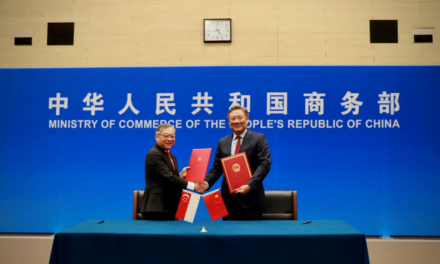The Singapore private sector’s speed of growth slowed last month as it steadied at a more sustainable level after a streak of strong expansion.
“The latest easing of growth momentum represented a convergence of growth momentum towards the long-run average, broadly aligning with a more sustainable level,” Jingyi Pan, an economics associate director at S&P Global Market Intelligence, told Diplomatic Network (Asia) on Friday.
The headline seasonally adjusted S&P Global Singapore Purchasing Manager’s Index – a composite single-figure indicator of performance – came in at 53.9 in November, down from 55.5 in October. This was according to data released by S&P Global last Wednesday.
“At the level in November, it notably remained buoyed above the series average with both new orders and output rising in the latest survey period,” Pan said.
“Forward-looking PMI sub-indices such as the new orders, backlogs of work and future output indices meanwhile pointed to the likelihood of sustained expansions in the coming months, even though the rates of growth may pale in comparison with the heights seen earlier this year as competition is reportedly on the rise.”
The Lion City’s private sector had a bumper third quarter of the year, with the PMI coming in at 57.2 in July, 57.6 in August, and 56.6 in September. This was well above the 50.0-point mark, where anything above indicates sector expansion.
More broadly, Singapore’s economy grew 5.4% year-on-year in the third quarter of 2024, up from 3.0% in the second quarter, the Ministry of Trade & Industry said last month.
Supply constraints
As the sector’s expansion reaches more manageable levels, supply constraints continue to be a looming issue.
“Vendor performance has been plagued by issues of shipping constraints since at least the start of 2024, with businesses most commonly citing shipping congestions and labor shortages as issues affecting lead times,” Pan said.
“Detailed sector data further showed that the issue is most prevalent in the goods-producing sector, with the rate at which delivery times lengthened remaining sharp in November to show little indications of a turnaround.”
Looking ahead
Business optimism took a knock in November as the positive momentum slowed. Firms were the least upbeat since July last year.
“[This reflected] concerns over heightened competition affecting sales in the next 12 months,” Pan said in a separate note last Wednesday.
Data
The S&P Global Singapore PMI is compiled by S&P Global from responses to questionnaires sent to purchasing managers in a panel of around 400 private sector companies. The panel is stratified by detailed sector and company workforce size, based on contributions to GDP. The sectors covered by the survey include manufacturing, construction, wholesale, retail, and services.
Survey responses are collected in the second half of each month.







